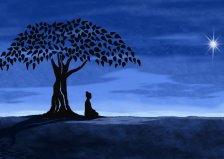HAVE YOU EVER STOOD BEHIND a Buddhist at a hot dog stand? It’s always the same thing:
What would you like?
Can you make me one with everything?
This craving for a sense of one-ness is at the heart of my spiritual practice. I want to dissolve the boundaries of self that separate me. I know that sounds like New Age mumbo-jumbo, but I’m hard pressed to think of any spiritual tradition that doesn’t try to tackle the problem of alienation.
 Christianity, for one, explains this alienation as the “fruit of man’s first disobedience” and nothing less than the sacrifice of God’s Beloved Son could appease the decree of Divine Justice and thereby reconcile us to God. And in the Jewish narrative, alienation takes the form of exile and the promise of return, a theme woven throughout Hebrew myth and history. In the East, Vedic traditions (Hinduism) make Yoga–or Divine Union–the aim of their spiritual disciplines, which entails penetrating the facade of individual selfhood to realize the Divine Spark that infuses the whole of creation.
Christianity, for one, explains this alienation as the “fruit of man’s first disobedience” and nothing less than the sacrifice of God’s Beloved Son could appease the decree of Divine Justice and thereby reconcile us to God. And in the Jewish narrative, alienation takes the form of exile and the promise of return, a theme woven throughout Hebrew myth and history. In the East, Vedic traditions (Hinduism) make Yoga–or Divine Union–the aim of their spiritual disciplines, which entails penetrating the facade of individual selfhood to realize the Divine Spark that infuses the whole of creation.
Buddhism, for its part, understands this sense of separateness as a dream, a delusion from which we must awaken. The notion of having a “self,” some enduring entity, is considered to be a trick of the mind, just a deeply entrenched mental construct. I find myself resisting this idea, sometimes viscerally. Other times, I’m drawn to it. Especially as I come to understand the idea more clearly.
 You see, it isn’t so much that Buddhism rejects the notion of a self, but it rejects the notion of a separate self, a self-contained, independently existent identify. The truth, in this way of thinking, is that we are not independent, but interdependent. This is a spiritual ecology: we are woven into the web of all existence, and each strand is inextricably linked to the whole.
You see, it isn’t so much that Buddhism rejects the notion of a self, but it rejects the notion of a separate self, a self-contained, independently existent identify. The truth, in this way of thinking, is that we are not independent, but interdependent. This is a spiritual ecology: we are woven into the web of all existence, and each strand is inextricably linked to the whole.
And yet, how persistent is the delusion, how unshakeable its resulting feeling of isolation. Einstein offered us a Humanist’s lens through which to understand this phenomenon when he observed that:
A human being is a part of the whole, called by us “Universe,” a part limited in time and space. He experiences himself, his thoughts and feelings as something separated from the rest — a kind of optical delusion of his consciousness. This delusion is a kind of prison for us, restricting us to our personal desires and to affection for a few persons nearest to us. Our task must be to free ourselves from this prison by widening our circle of compassion to embrace all living creatures and the whole of nature in its beauty.”
I know this. I bow to the beauty of this. So why am I still locked up inside that prison? Why do I persist in labeling everything in terms of “Me” and “Not-me,” depending on which side of my epidermis it happens to be? Am I destined forever to view myself, to borrow a phrase from Alan Watts, as an “isolated ego inside a bag of skin”?
Ah, the ego. That “I” which renders us so utterly myopic. There’s a term in Vedic philosophy—ahamkara in Sankskrit —that means, literally, “I-maker.” It refers to the part of us that creates a sense of selfhood. So, does the universal instinct to create a sense of self arise because this, in fact, accords with reality? Or is it merely a mirage? an abstraction? a term for something imaginary, like the number zero, which doesn’t actually exist but is nonetheless useful? And whether real or imagined, how do we keep the ego from overstating its place in the cosmos?
For Zen Buddhists, the practice of zazen, or seated meditation, is one way to silence the ego, or at least blur the lines between us and other. In Zen Mind, Beginner’s Mind, Roshi Suzuki explains that, during breathing meditation,
When we inhale, the air comes into the inner world. When we exhale, the air goes out to the outer world. The inner world is limitless, and the outer world is also limitless. We say “inner world” or “outer world,” but actually there is just one whole world. In this limitless world, our throat is like a swinging door. The air comes in and goes out like someone passing through a swinging door. If you think, “I breathe,” the “I” is extra. There is no you to say “I.” What we call “I” is just a swinging door…”
This is part of my spiritual practice, and it works for me. At least it works until I notice it’s working. Then my ego stands up to take a bow (Look at me! I’m so . . . enlightened!) or else, ignored too long, it throws a tantrum and starts banging its tin cup against the bars of my mind.
If sitting cross-legged isn’t your cup of green tea, I’m happy to let you in on a secret: the prison warden has also (temporarily) let me out of my ego-cell at the following moments:
- drifting in a kayak at Monterey Bay with sea otters
- partaking of the sacrament of communion
- sitting in a field of birds (without my field guide and lists)
- those first two minutes of the “Adagio” in Rodrigo’s Concierto de Aranjuez, as interpreted by Julian Bream
- in the union of love-making with my beloved
- watching a camp fire when everyone’s done talking
- lying on my back facing a big sky
- bowing to a bowl of soup at Deer Park Monastery
 These are fleeting moments of liberation, to be sure. But they suggest more is possible. What they teach me is that, regardless of whether that “bag of skin” I call myself in fact envelopes an enduring identity or is just a soul-stunting illusion, I can experience times when I am deeply connected to those around me—indeed, with the whole universe.
These are fleeting moments of liberation, to be sure. But they suggest more is possible. What they teach me is that, regardless of whether that “bag of skin” I call myself in fact envelopes an enduring identity or is just a soul-stunting illusion, I can experience times when I am deeply connected to those around me—indeed, with the whole universe.
For now, I choose to think of my identity as a constituent cell of some vast and beautiful organism. That cell has shape and definition, and perhaps a crucial function to perform, however small. But the vitality of that cell—that individual self—requires that it be encapsulated in a membrane that is not sealed off from the rest of the organism. In biology, these kinds of cell walls are said to be semi-permeable. The osmotic exchanges upon which life depend happen only when a cell is willing to give and willing to receive—to remain open and vulnerable to possibilities.
In the meantime, if I can’t be subsumed like a dewdrop into the ocean, then let me, like the poet, say to all the universe, Let there be commerce between us.



This is so beautiful. Thank you, thank you, thank you, for sharing Ezra Pound, Einstein, Roshi Suzuki, and Lon Young with us! This brought grateful tears to my eyes. Thank you.
LikeLike
Thank you, Marilyn. It’s so gratifying to read your generous responses.
LikeLiked by 1 person